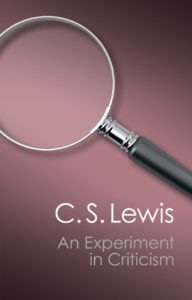 A very pleasant task I’ve set for myself is to read C. S. Lewis works that I’ve not yet taken the opportunity to examine. In this journey, I’ve taken on The Discarded Image, The Allegory of Love (tough read for me; not done yet), and now An Experiment in Criticism.
A very pleasant task I’ve set for myself is to read C. S. Lewis works that I’ve not yet taken the opportunity to examine. In this journey, I’ve taken on The Discarded Image, The Allegory of Love (tough read for me; not done yet), and now An Experiment in Criticism.
Since I’m a historian and not a literary critic per se, I admit I was hesitant to tackle this one, figuring it might be too dense for my taste, too pedantic perhaps.
That prejudgment was completely wrong.
What an unanticipated joy it has been to follow Lewis’s thinking in this little book. I even discovered, in the first chapter, some quotes I’ve appreciated before when he distinguishes between what he refers to as “the few and the many” when it comes to the types of readers.
“In the first place, the majority never read anything twice,” he opines. “The sure mark of an unliterary man is that he considers ‘I’ve read it already’ to be a conclusive argument against reading a work.” Great works, though, he argues, should be read multiple times over the course of one’s life.
A second difference, Lewis notes, is that “the many” turn to reading only if there’s nothing else that pops up that they would rather do. “It is kept for railway journeys, illnesses, odd moments of enforced solitude, or for the process called ‘reading oneself to sleep.'” Whereas the devoted readers—the few—“feel impoverished” if they are denied “attentive and undisturbed reading even for a few days.”
A third distinction is that the literary are so drawn into what they read that they often have an experience “so momentous that only experiences of love, religion, or bereavement can furnish a standard of comparison. Their whole consciousness is changed. They have become what they were not before.”
His final distinguishing characteristic?
As a natural result of their different behaviour in reading, what they have read is constantly and prominently present to the mind of the few, but not to that of the many. The former mouth over their favourite lines and stanzas in solitude. . . . They talk to one another about books, often and at length. The latter seldom think or talk of their reading.
 While Lewis is focusing on novels and poetry in his comments, I’d add that, for me, it isn’t limited to those genres. Really good nonfiction writing also can qualify. For instance, there’s Lewis’s own works such as Mere Christianity or his autobiography, Surprised By Joy. I repeat lines from those in my mind regularly.
While Lewis is focusing on novels and poetry in his comments, I’d add that, for me, it isn’t limited to those genres. Really good nonfiction writing also can qualify. For instance, there’s Lewis’s own works such as Mere Christianity or his autobiography, Surprised By Joy. I repeat lines from those in my mind regularly.
I’ve had this experience with other books also. Whittaker Chambers’s Witness is awash with such memorable lines, phrases, and meaningful paragraphs that I have taught it constantly to students for thirty years. I highly recommend it to all who love excellent, striking prose.
Near the end of chapter one in An Experiment in Criticism, Lewis sums up nicely the reaction “the many” have toward “the few.”
It is pretty clear that the majority, if they spoke without passion and were fully articulate, would not accuse us of liking the wrong books, but of making such a fuss about any books at all. We treat as a main ingredient in our well-being something which to them is marginal.
So is Lewis intimating that “the few” are somehow superior humans who should look down on those who don’t have the same perspective on reading? Not at all. Those who are familiar with Lewis’s humility would never accuse him of that. In fact, he addresses that very issue in chapter two.
But that’s for next Saturday’s post.
